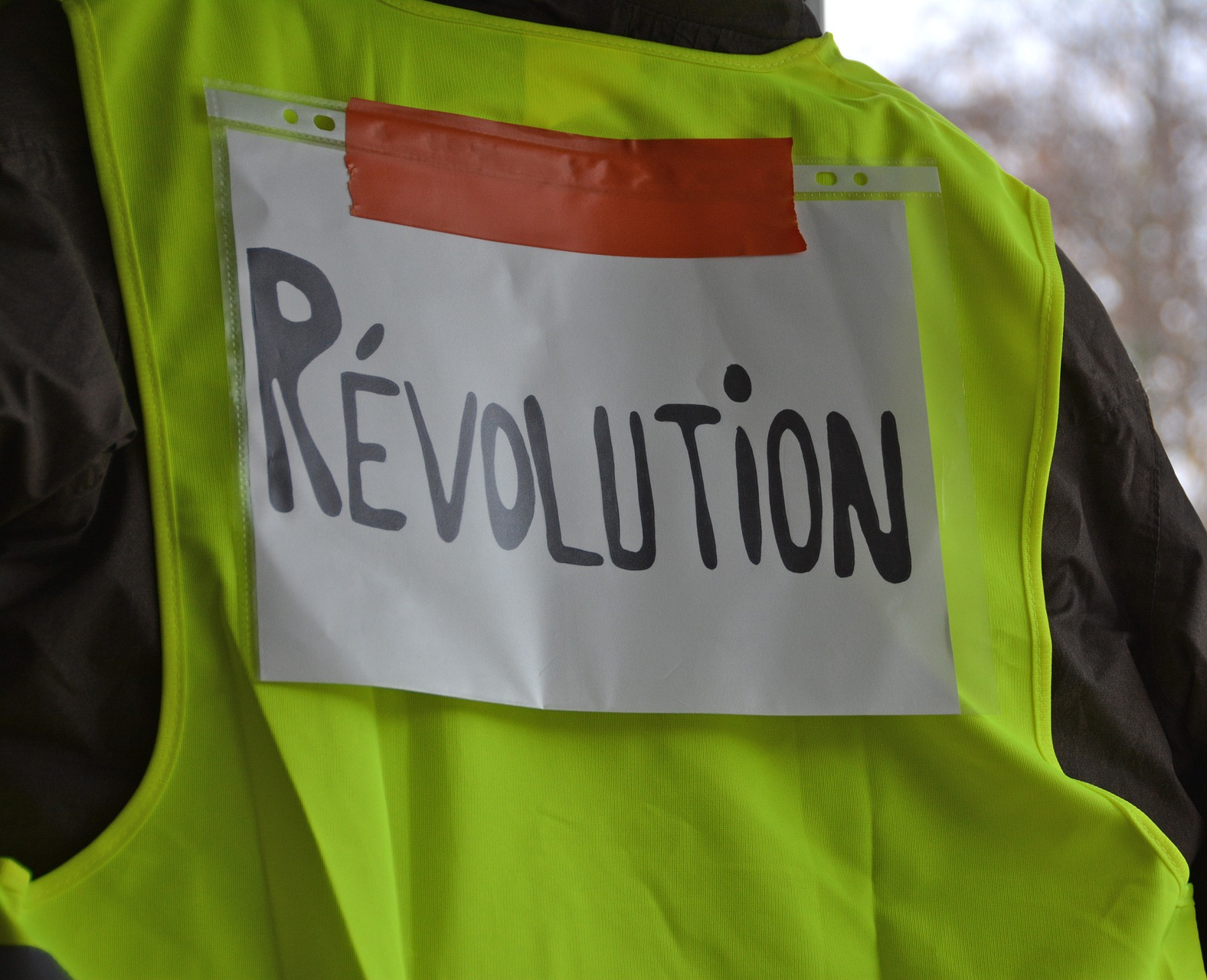Debate: Purchasing power and carbon tax, the obsolescence of political categories
Fabrice Flipo, Institut Mines-Télécom Business School
[divider style=”dotted” top=”20″ bottom=”20″]
[dropcap]W[/dropcap]hen it comes to social and ecological concerns, many dream of reconciling the two, but few have a solution. The “yellow vests” have just provided a reminder of this fact, as they do not identify with anything offered by organized groups, whether political, union-based or even community-oriented.
So what can be done? Are we destined for failure? The study of major political ideas can help provide a way forward.
With the “yellow vests,” the traditional questions about ways of life can be seen from an unexpected angle. The key demand is for purchasing power, but observations and surveys have also revealed concern about climate issues. What can be done? How can social and ecological issues be brought together?
“Being poor” in France and elsewhere
First let’s take a look at the key factors involved.
To begin with, let us remember that if we disregard redistribution through taxes, purchasing power is determined by two key elements: income and wealth. As for income, the richest 10% of the population in France earns around €300 billion, while the poorest 10% earn 10 times less. But this figure masks the slow salary growth for the majority of the population; those in management positions are the only ones who have seen significant increases in their income over time.
As far as wealth is concerned, there is even greater inequality: the poorest 50% of the population possesses 8% of all wealth while those who make up the richest 1% possess 17% of the wealth (and this figure rises to 50% when considering the wealthiest 10%). That explains the average wealth of €16,000 for unskilled workers. And this is only taking averages into consideration. Individual examples of success are even more striking.
Bernard Arnault earns €3.5 million a month for his work at LVMH; a salary comparable to that of football player Kylian Mbappé with his monthly salary of €2 million. This means Bernard Arnault earns the equivalent of a monthly minimum wage salary every four minutes. He also possesses a fortune of €73 billion which provides him with €300 million in dividends, which is the equivalent of 100 times his salary at LVMH. It could be argued that this is an extreme case, but it is a visible reality in France, where so many people are struggling just to make ends meet.
Furthermore, there is the problem of “necessities,” to use Marx’s expression, meaning items that are considered necessary to live. While inflation may be low, the basket price for items that are deemed essential is on the rise. The cost of digital technology, for example, has been added to this list.
The scale used by the French charity Secours Populaire Français illustrates this point: “being poor” in France corresponds to an ever-higher level of income; it is now defined as earning €1,118 a month, while the minimum net monthly salary is €1,150. Earning minimum wage in France now means earning only €32 more than what is considered the poverty line.
This threshold must be compared with that used to define belonging to the “global middle class” based on the same statistics as those used in France: this level is defined as between €4,000 and €6,000 per year, which works out to between €300 and €500 per month.
As economics Nobel Prize winner Amartya Sen has pointed out, poverty is a social construct and when it comes to this issue, the benchmarks are still largely national. Taken together, these two observations clearly conclude that the majority of French people are trapped between two blades of scissors – that which allows them to earn money and that which controls how they spend it.
1,000,000 tons of CO2 for Bernard Arnault
We will now try to express this information in terms of climate and energy.
Based on several studies, economist Jean Gadrey estimates, using “the means available,” that the richest 1% of the French population emit approximately 160 tons of carbon per person per year, compared to 4 tons for the poorest 10%. The poorest 10% of the population therefore emits 28 million tons, compared to 112 million tons for the richest 1% (based on a population of 70 million).
Based on this type of calculation, it can be concluded that Bernard Arnault emits 1,000,000 tons by himself (if one minimum wage salary is worth 4 tons of CO2).
This simple observation illustrates the futility of a carbon tax which would not, at minimum, be based on income. Either it would be a high tax and low-income households, meaning the majority French households, would not be liable for paying it, or it would be kept at a very low level and it would have no impact on the climate. A recent report by ADEME (the French Environment and Energy Management Agency) shows that French people are engaged in climate protection, but to take further action they ask that changes be shared in a fair, democratic way. These opinions have remained stable in the last two surveys.
Surprisingly, the figures presented here and those reported by Jean Gadrey using “the means available” have not been a focus of the debate or have not been presented clearly. The “yellow vests” plainly see that those being asked to make the biggest sacrifices are those who need their small quantity of CO2 the most. Admittedly, it is still too much for the planet … but then what can be said about the others!
Strategies to be invented
So what can be done?
The current government has embraced a traditionally liberal argument: let the market sort itself out. In other words, the economy should be left alone, in order to “respond to demand” and help France prosper. Historically, this strategy has been partially successful since France possesses huge multinationals and remains one of the top-ranking world economies despite its small size, without being as financialized as London’s City. Yet there is a downside to this strategy: an ever-greater concentration of wealth.
Can people really improve their situation simply by “crossing the street” or by founding start-ups? Economist Thomas Piketty’s work has shown that this is clearly not the case: when there is little growth – meaning few possibilities to create wealth that could result in income – those with the largest fortunes benefit since they run the game.
A number of different solutions may be explored, from all sides of the political spectrum.
Those with the most liberal leanings will encourage the richest part of the population to decarbonize the economy, which is undoubtedly what Emmanuel Macron hoped to do by giving businesses and their owners more room for maneuver. This would require these stakeholders to be ready to take on this role and to a great enough extent. Whatever we may think about the credibility of such a scenario, the fact remains that it has not been supported by any evidence.
Another scenario would be for major players, like Bernard Arnault for one, to stop acting like rentiers, using and abusing their market position to keep new players out of the market. This would mean putting an end to the “laissez-faire” system, but it would not necessarily mean the end of a liberal system in the sense that some liberals – like the classic Natural Capitalism by Paul Hawken, Amory B. Lovins and L. Hunter Lovins – could also consider that those with giant fortunes pose a threat to freedom. This was one of the reasons behind United States antitrust laws, for example. Those who are more conservative (including the Rassemblement National) will certainly be averse to opposing major interests and will refuse to change the social order as it stands. A more socialist approach would seek to make use of the State, whether directly through public expenditure (Keynesian), by controlling public companies, or by increasing the minimum wage. And we must remember that the current government did not increase the minimum wage because it wants to use taxes, meaning the income of non-minimum wage employees, to increase in-work benefits, and not wages themselves.
Yet the State alone will not be able to change people’s daily lives: reorganizing territories and deploying renewable energy require much greater efforts – setting up networks, training people to work with the equipment, etc.
The traditional political positions appear to be poorly suited to respond to ecological issues. This can be seen by studying the political ideas and events that have occurred over the past decades. The “yellow vests” have successfully demonstrated this through their refusal of the existing divisions. So aren’t they the ones who could help us determine where to go from here? An alliance of progressives, across historic divides, is the most plausible path to take.
[divider style=”dotted” top=”20″ bottom=”20″]
Fabrice Flipo, Professor of social and political philosophy, epistemology and history of science and technology at Institut Mines-Télécom Business School
The original version of this article (in French) was published on the website of The Conversation France.
Also read on I’MTech
[one_half]
[/one_half][one_half_last]
[/one_half_last]





Leave a Reply
Want to join the discussion?Feel free to contribute!